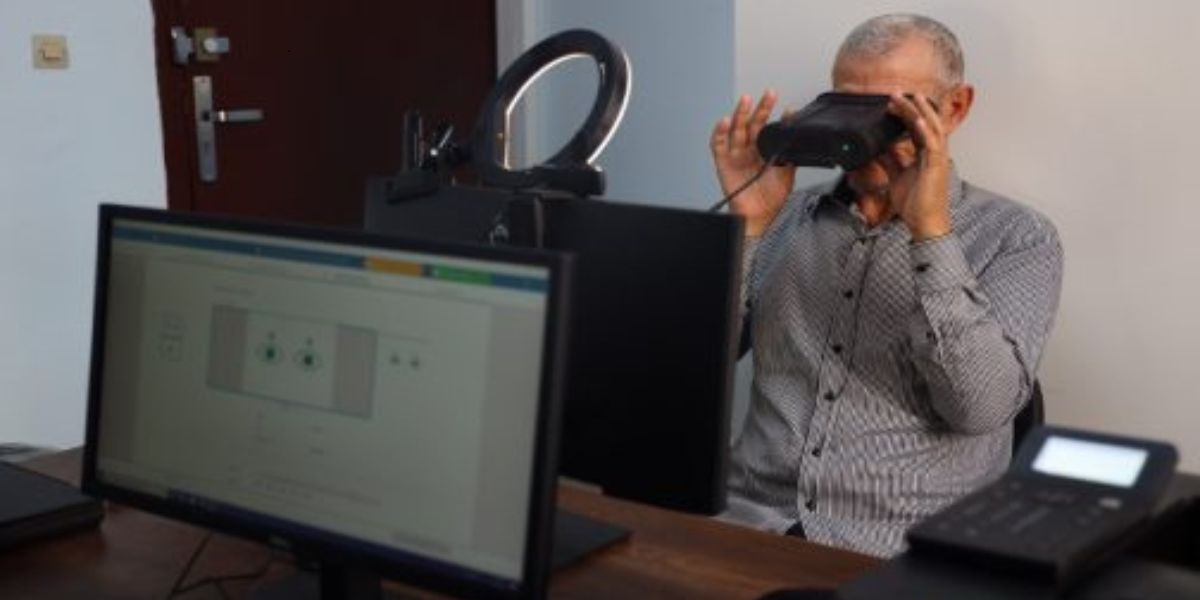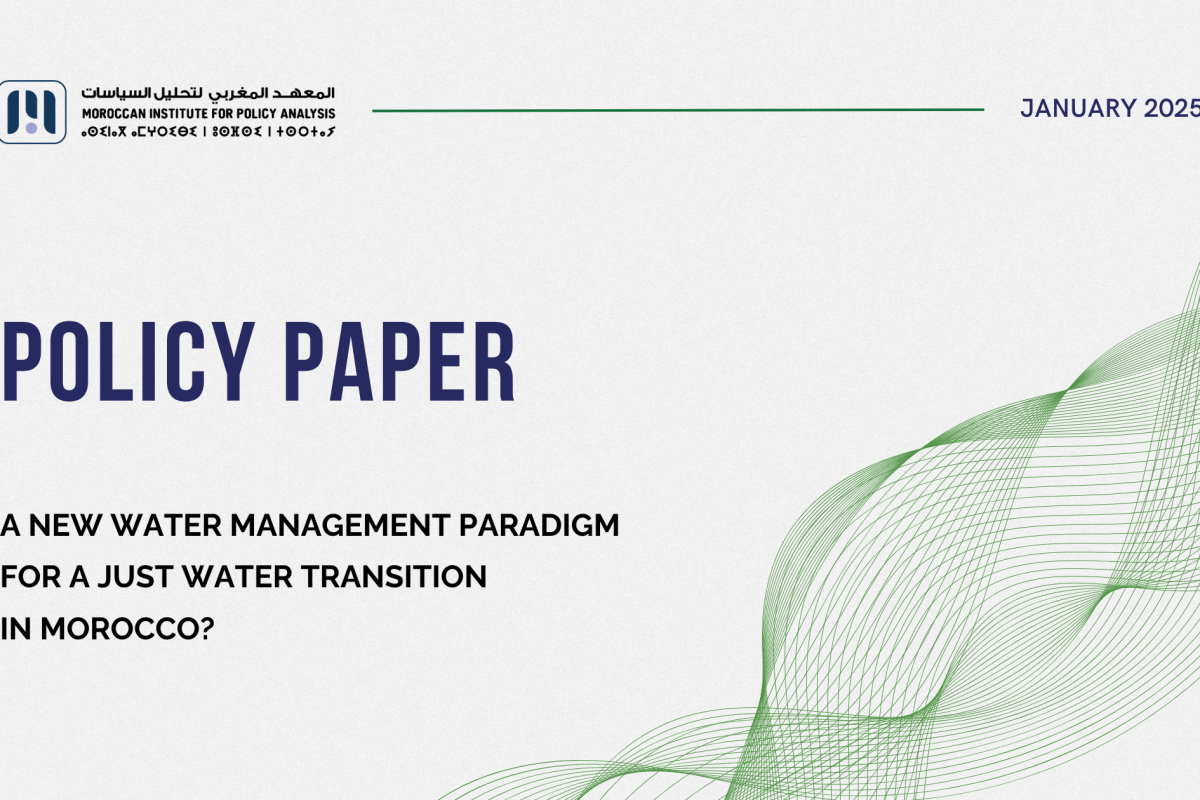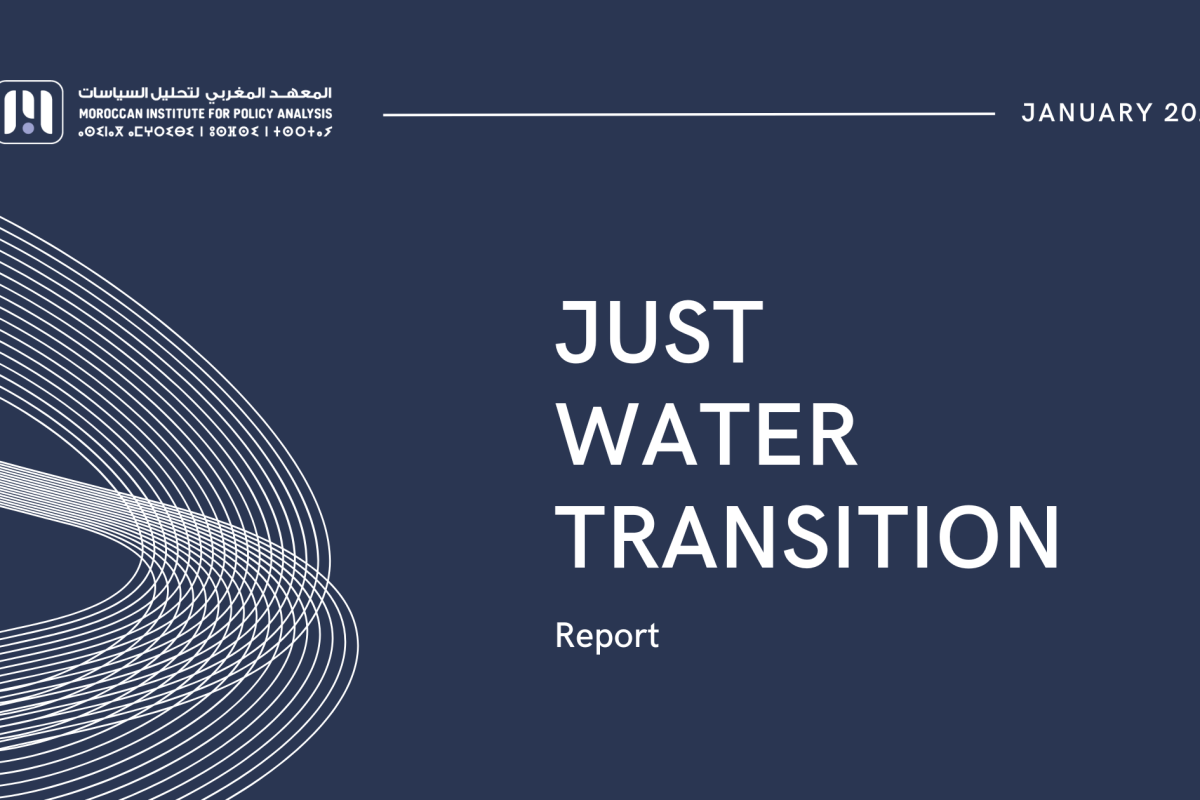[vc_row][vc_column][vc_column_text]
COVID-19: How Moroccans view the Government’s Measures?
Download report
By:
Introduction
On March 20th, 2020, the Moroccan government declared health emergency in the country, and took a set of strict measures aimed at preventing the spread of the novel Coronavirus. These measures included restricting movement and deploying security forces to ensure compliance with these measures. Prior to this, on March 17th, the government orderedthe closure of schools, cafes, restaurants, mosques and the ban of large gatherings. On March 22nd, about 104 cases have been confirmed infected with the virus, and the number appears to be likely to rise in the coming days.
The government’s communication was different than it used to be, as the authorities communicated continuously and intensively through the various official communication channels and social media platforms, the Ministry of Health also published timely data and clarifications in order to increase awareness of citizens about the epidemiological situation in the country. The public and private media also operated around the clock through special programs to raise awareness of the danger of the virus.
In this context, the Moroccan Institute for Policy Analysis completed a quantitative field study on the novel Coronavirus, with the aim of providing statistical data on the perceptions of Moroccan citizens about this pandemic, and to measure the extent of their awareness and their satisfaction with the governmental measures that responded to this pandemic. Although the phenomenon is still unfolding, this survey tries to provide a preliminary image of the citizens views and the level of their support for the policies pursued, and also to gauge the degree of their compliance with the precautions to prevent the spread of the virus. This survey would assist decision-makers in formulating more acceptable policies to control the spreading of the virus in the short term, and also help restore confidence in government and state institutions in the medium and long term.
Methodology
The survey adopted a quantitative research method through the use of self-filling questionnaire via the Internet through the use of Qualtrics software, which is a program intended for online surveys. The questionnaires were filled out by the respondents between 14 and 19 March 2020, and they were sent to the institute’s database (which includes about 1500 people that includes researchers, experts, decision makers and civil society activists), in addition to sharing them through social media, especially Facebook and Twitter, to ensure a representative geographical distribution of the respondents participating in the survey.
The sample included 2470 representing the Moroccan population aged 18 years or over. Quotas method (gender, age and geographic region) was adopted to ensure sample balance. The study sought to ensure a broad representation of the population by taking into account the data provided by the general population census carried out by the High Commissioner for Panning (HCP 2014).
A number of precautions have been taken to ensure the reliability and credibility of the answers and the diversity of the sample in the study, inter alia, not allowing the questionnaire to be filled out more than once using the same device or e-mail. It was also confirmed that the forms were filled out by people, in order to avoid having answers filled out by Botnet machines. This issue has already been verified by looking at the IP addresses of the respondents. Finally, the participants were asked to write their emails voluntarily in case they wanted to receive the survey results later.
With regard to the distribution of the sample by gender, about half of the participants were females. As for the age, the age group of 18-25 years constitutes about a quarter of the participants, the age group of 26-35 years constitutes about a third of the participants, whereas the age group of 36-45 years is about 23%. As for the geographical distribution, about 15% of the sample was from Rabat-Sale-Kenitra region, 20% from Casablanca-Settat, 10% from Tangier-Tetouan-Al Hoceima, 8% from Souss-Massa, 12% from Fez-Meknes, 13% from Marrakesh-Safi, and 7% from the Orient region, while the rest of the sample was distributed among other regions of the Kingdom.
About 29% of the respondents work in the private sector, while 28% work in the public sector, 20% are students, whereas 9% are unemployed. People with income less than 3000 dirhams constitute about 31% of the sample, 43% earn between 3,000 and 8,000 dirhams per month, whereas 26% earn more than 8,000 dirhams per month. As for the educational level, about 46% of the respondents have a university level (Bachelor), 20% hold a Master’s degree, 8% hold a Doctorate, while 13% have high school education level, and 9% are in vocational training.
The sample
Figure 1: Distribution of the respondents according to gender

Figure 2: Distribution of the respondents according to age

Figure 3: Distribution of respondents according to geographic regions

Figure 4: Distribution of respondents according to profession
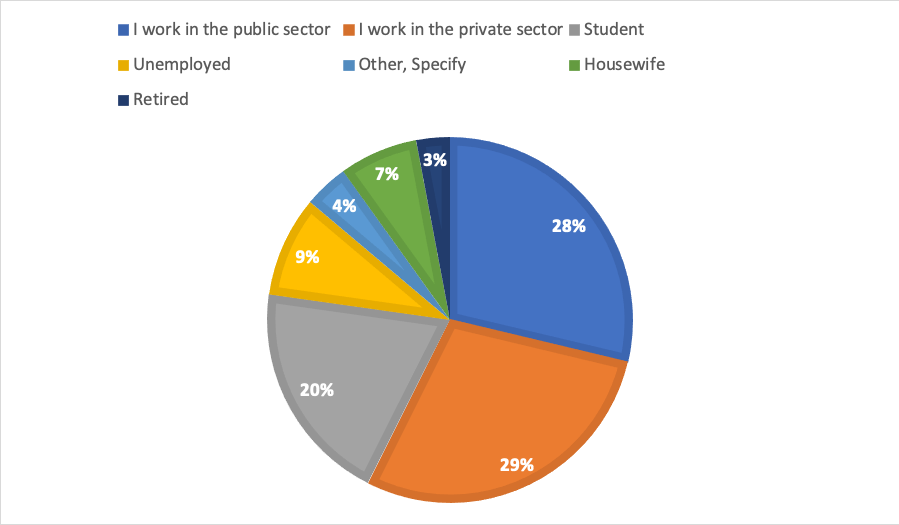
Figure 5: Distribution of respondents according to monthly income
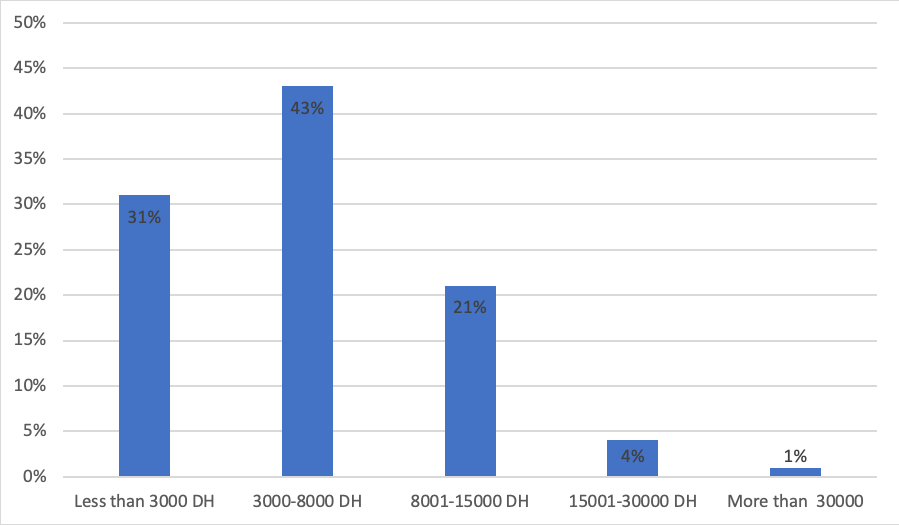
Figure 6: Distribution of the respondents according to educational level

The Findings
Personal concerns about the spread of the Virus
This section is devoted to the citizens concerns about getting infected with the novel Coronavirus, and also the extent of concern about the possibility of the virus spreading in Morocco and its impact on the economy.
In this context, the survey results show that 81% of Moroccan citizens expressed their concern about getting infected with Coronavirus, 29% are very concerned about getting infected with this virus, while only 4% said that they are not at all concerned about getting infected with this virus.
As for the respondents’ fear of the spread of the novel pandemic Covid-19 in Morocco, 96% of those who answered this question said that they are concerned about the spread of the virus in the country (69% of the respondents said they very concerned and 27% are concerned), and only 1% said that they are not concerned at all about this occurring.
The survey also touched upon Moroccan citizens’ views regarding the effects of this global pandemic on the national economy, the results of the survey showed the extent of concern of Moroccan citizens about the effects of this virus on Moroccan economic activity, as 59% of citizens said that they are very concerned about the impact of Coronavirus on the Moroccan economy, 31% said they are concerned about this matter as well, which means that 90% of the respondents are worried about the impact of this pandemic on Moroccan economic activity.
It should be noted that women are more worried than men, with 86% of women saying they are concerned about getting infected with Coronavirus, compared to 77% of men. 98% of women also expressed concern about the spread of the virus in Morocco, compared to 94% for men. Women and men are also equally concerned about the economic impact of this pandemic, as 90% of men and women said they are worried about the impact of the virus on Moroccan economy.
On the other hand, young groups appear to be more concerned about the spread of the virus compared to the older groups; where about 81% of the age group of people younger than 35 years expressed their concern about getting infected with the virus, whereas the percentage did not exceed 72% for the age group of 60 years and over. 97% of young people expressed their concern about the spread of the virus in Morocco, compared to 86% for the older age groups. However, the older age groups show greater concern about the economic impact of the virus, with 96% of the elderly saying that they are worried about the impact of the virus on Moroccan economy, compared to 87% for the age groups of 26-35 years.
Nevertheless, concern about the spread of the virus does not mean that citizens are considering traveling to another place, as 88% of Moroccans said that they do not consider traveling from where they currently live in the event of an outbreak of the Corona pandemic in Morocco, while 12% said they might consider moving to a city or village other than their place of residence if this happens.
Concern about the spread of Coronavirus also appears through the follow-up on the latest developments regarding the spread of Coronavirus around the world, with 48% of respondents saying that they follow up the developments of the Coronavirus spread moment to moment, while the percentage of those who do not follow up the latest developments is limited to 1% of the respondents, and 7% said that they follow up the news of the spread of the novel Coronavirus intermittently.
Figure 7: The concern about infection with Coronavirus

Figure 8: Concern about the spread of Coronavirus in Morocco

Figure 9: Concern that the virus would impact the Moroccan economy
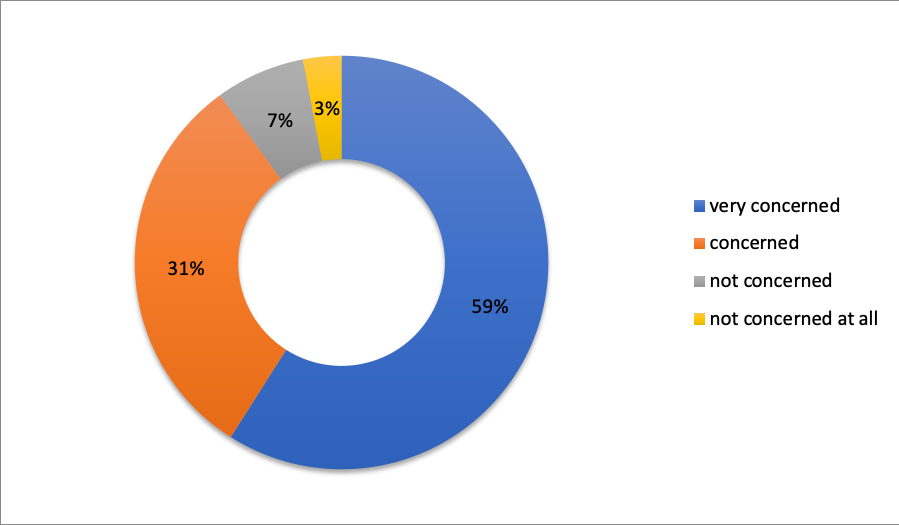
Figure10: The follow-up of the developments of the Coronavirus spread in the world

Figure 11: Considering traveling to another place (city or village) if Coronavirus prevails more in Morocco
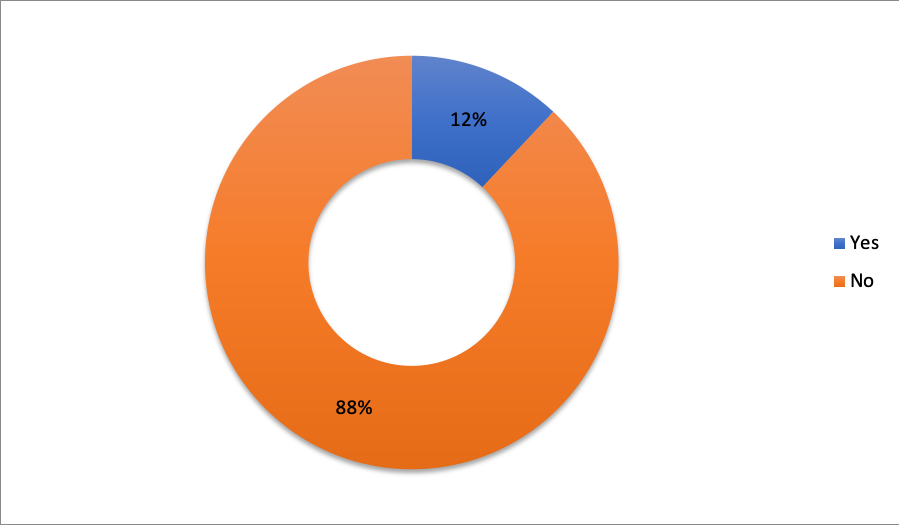
Obtaining information and their sources
Since the announcement of the first cases of Coronavirus, the Moroccan government has been communicating extensively and continuously on this matter. One of the important methods of prevention is obtaining the correct directions. The publication of accurate and medical information helps sensitizing citizens about the seriousness of the situation and taking the necessary precautions that may help reduce the spread of the virus.
In this regard, questions were asked about whether the citizens who participated in this survey had attempted to obtain directions and information about the Coronavirus. The results indicate that 91% of the respondents said that they tried to obtain directions about Coronavirus during the past days, while 9% said they had not tried to do so.
The sources of directions that Moroccan citizens relied on varied, 88% of all respondents relied on the Internet, 68% followed the directions and data of the Moroccan Ministry of Health, while 11% communicated with doctors and 5% with pharmacists in order to obtain guidance on the disease, and 19% of respondents confirmed that they drew news about the Corona pandemic by communicating with their friends.
In this sense, it appears that women and younger age groups are slightly more eager to obtain guidance than men and older age groups, as 93.5% of women and 92% of young adults said they had tried to obtain directions about Coronavirus during the past days while it reaches 89% for men and 85% for older groups. Women also appear to be more eager to obtain information from doctors or Ministry of Health directions, with 12% and 63%, respectively, while the percentage among men decreases to 7% (consulting with a doctor) and 54% (Ministry of Health directions).
Figure 12: attempt of obtaining guidance about Coronavirus during the previous days

Figure 13 : Source of directions
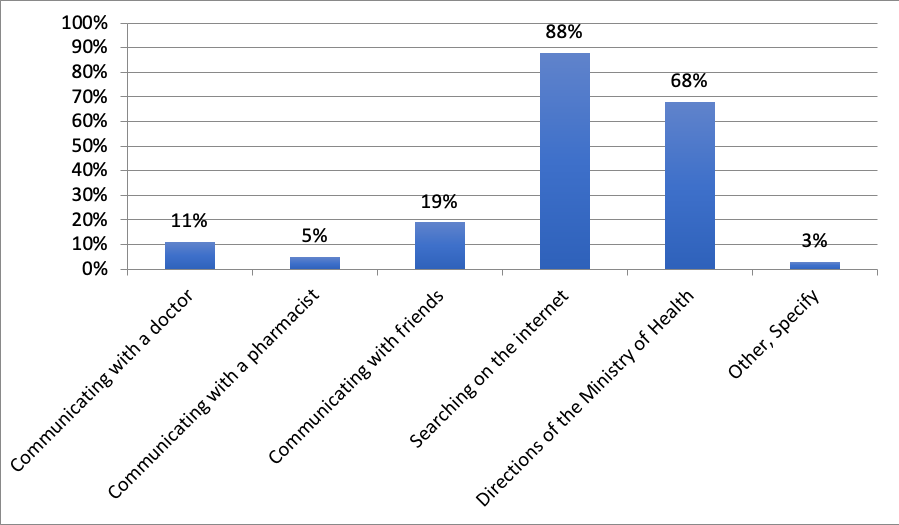
Preventive Behaviors and Precautions
Moreover, questions were also asked regarding the precautions taken by citizens to avoid infection with Coronavirus. This includes washing hands several times a day, self-confinement and wearing medical masks. Regarding the precautions taken by respondents, 97% of participants said that they wash their hands several times a day, 82% said they avoid leaving the house except in cases of necessity, and only 12% confirmed that they wear medical masks.
A question regarding consuming behavior was asked after the emergence of the Coronavirus in Morocco, the fear of some citizens on the scarcity of some basic materials, and the widespread of photos and videos of stampede in some supermarkets over grocery shopping. In this context, the results are somewhat counterintuitive. 84% of respondents confirmed that they had not made purchases that exceeded their usual purchase rate during the past days, whereas 16% confirmed that they had actually made purchases that exceeded the normal rate of their purchases before the pandemic. Regarding the kind of the purchases, 93% of respondents confirmed that they had purchased food, 70% cleaning supplies, 28% medications and 3% purchased entertainment items.
As a matter of fact, the age group of 36-45 said they purchased what exceeds the average of their purchases during the past days, where the percentage reached 23.5%, compared to 8% for the younger age groups.
Figure14: Personal precautions to avoid Coronavirus

Figure15: purchasing above the normal rate during the past few days
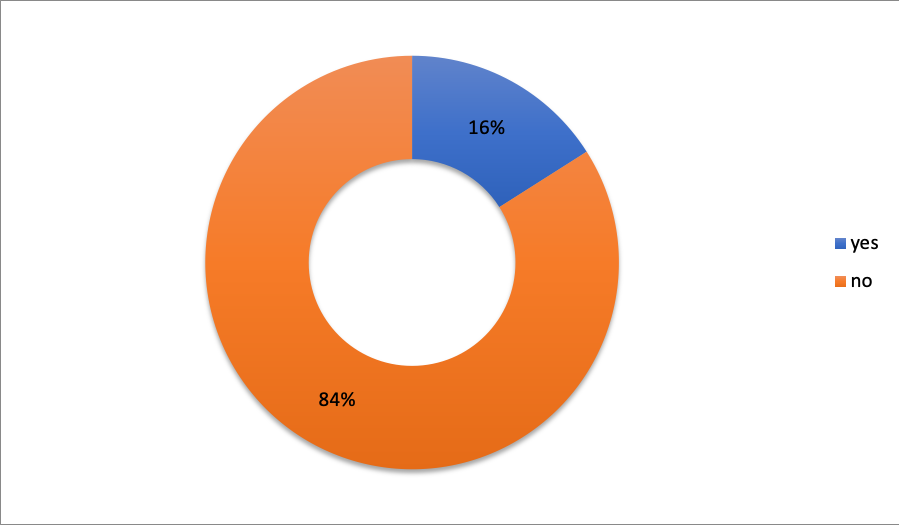
Figure 16 : The kind of purchases

Perceptions on the Governmental Measures
This section has been devoted to finding out the opinions of citizens about the decisions and measures taken by the government in the past days to contain the Coronavirus, and this includes the extent of confidence in the government’s capability to comprehend this pandemic, the citizens’ satisfaction with government communication, and finally to find out the degree of their agreement, or disagreement, regarding the government’s precautionary measures such as closing schools and mosques and preventing social gatherings.
It appears that the citizens are satisfied in general with the measures taken by the government in the past days to control the Coronavirus, yet they are not that confident of the ability of the government and the health sector to respond to this pandemic.
In this regard, 77% of Moroccan respondents expressed their satisfaction with the measures taken by the government to counter the novel Coronavirus, whereas 18% said they were dissatisfied with the action of the government, and 4% said they were completely dissatisfied with the action of the government during this period. 82% of women expressed their satisfaction with the measures taken by the government to control the novel Coronavirus, whereas the percentage drops to 73 % for men.
Regarding the degree of confidence of Moroccan citizens in the government’s ability to respond to the novel Coronavirus, 58% confirmed their confidence (15% fully trust it and 43% trust somehow) compared to 48% who do not trust its ability to respond to the Coronavirus (33% do not trust it and 9% do not trust it at all).
The extent of confidence of Moroccan citizens in public health facilities came at the lowest level, with 74% saying that they do not trust the Moroccan ability to counter the effects of Coronavirus, compared to only 26% who trust the ability of Moroccan hospitals to treat patients infected with the virus.
Conversely, half of the Moroccans participating in the survey confirmed that the Moroccan government is communicating well during this crisis, as 21% said that they are communicating very well, and this is considered to be a high satisfaction at the level of government communication during this emergency crisis. 28% of citizens said that the government does not communicate well with the citizens.
As for the public media, 66% of citizens expressed their satisfaction with the public media communication during this crisis, and 18% said they are very satisfied with the Moroccan public media service. Whereas 28% expressed their dissatisfaction with the media during this crisis, and 6% said they were totally dissatisfied with it during this crisis.
Before conducting this survey, the Moroccan government launched a set of preventive measures. Moroccan citizens expressed their “considerable agreement” that ranged between 71% and 93% regarding five measures taken by the government; 100% of the respondents confirmed their agreement to “prevent large gatherings”, 100% of them agreed on “travel ban to and from Morocco”, 99% agreed with “suspending public and private schooling” and 90% agreed with “suspending Friday prayers and congregational prayers in mosques.”
Regarding those who objected to these measures, only 10% expressed their disapproval of “suspending Friday prayers and congregational prayers in mosques”, and 3% said they disagreed with this measure, and 1% said they disagree with “suspending public and private schooling”.
Figure17: The degree of the Moroccan government’s communication regarding the Coronavirus

Figure18: The Moroccan public media’s communication regarding the Coronavirus

Figure19: Degree of satisfaction with the measures taken by the government to respond to the Coronavirus

Figure20: Confidence in the government’s ability to respond to the Coronavirus

Figure21: Confidence in the ability of Moroccan hospitals to treat patients with Coronavirus

Figure22: Endorsement of procedures to prevent Coronavirus
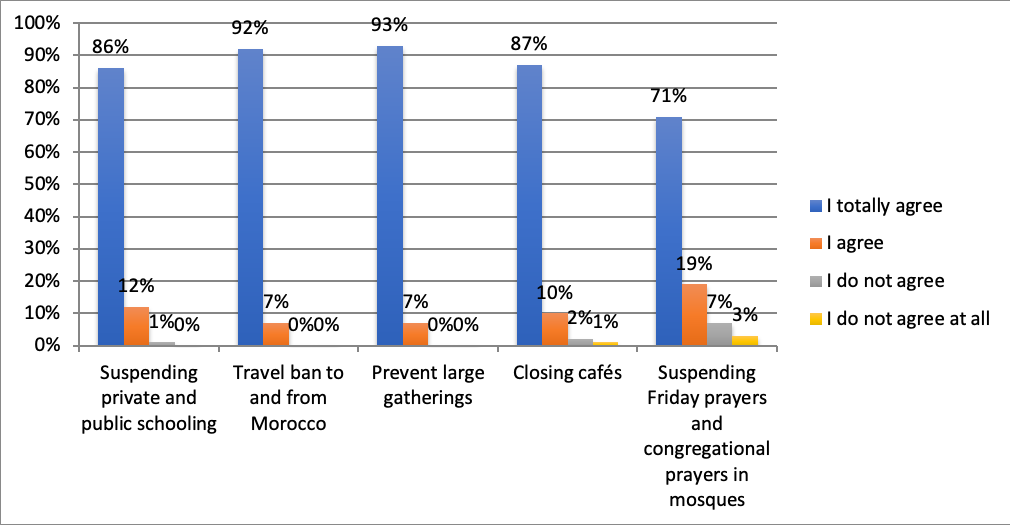
About the authors:
Dr. Mohammed Masbah, director of the Moroccan Institute for Policy Analysis and associate fellow of the Middle East and North Africa Program at Chatham House. He worked previously as a non-resident researcher at the Carnegie Endowment for International Peace and a fellow at the German Institute for International and Security Affairs. He is a researcher in politics and sociology whose work focuses on authoritarianism, youth movements, and political Islam, with emphasis on North Africa. Dr. Masbah holds a PhD in Sociology from the University of Mohamed V in Rabat.
Dr. Rachid Aourraz, a senior researcher at the Moroccan Institute for Policy Analysis, and a Moroccan economic researcher specializing in the impact of education, economic, political and social institutions on economic dynamism. He conducted studies and wrote articles for a number of local and Arab newspapers, and contributed to discussions on Moroccan and Arab channels, as well as contributed to translating a number of publications in recent years. Dr. Rachid Aourraz holds a PhD in Applied Economics from Ibn Zohr University in Agadir.[/vc_column_text][/vc_column][/vc_row]
MIPA Institute
MIPA is a non-profit independent research institution based in Rabat, Morocco. Founded by a group of transdisciplinary researchers, MIPA’s mission is to produce systematic and in-depth analysis of relevant policy issues that lead to new and innovative ideas for solving some of the most pressing issues relating to democracy.
